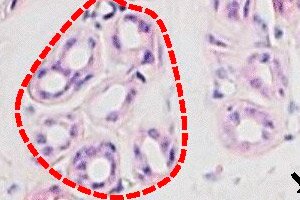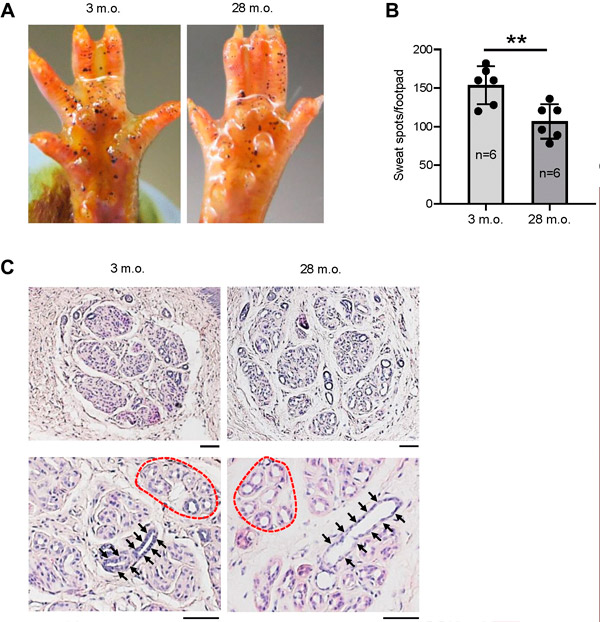
All iLive content is medically reviewed or fact checked to ensure as much factual accuracy as possible.
We have strict sourcing guidelines and only link to reputable media sites, academic research institutions and, whenever possible, medically peer reviewed studies. Note that the numbers in parentheses ([1], [2], etc.) are clickable links to these studies.
If you feel that any of our content is inaccurate, out-of-date, or otherwise questionable, please select it and press Ctrl + Enter.
Study reveals age-related changes in gene expression in sweat glands
Last reviewed: 02.07.2025
 ">
">The new study, published in the journal Aging, is titled "Characterization of age-related gene expression changes in mouse sweat glands."
Evaporation of sweat on the skin surface is the main mechanism of heat dissipation in humans. The secretory capacity of sweat glands (SG) decreases with age, leading to heat intolerance in the elderly, but the mechanisms responsible for this decrease are poorly understood.
In this new study, researchers Alexandra G. Sonnefeld, Chang-Yi Cui, Dimitrios Tsitsipatis, Yulan Piao, Jingshui Fan, Christina Mazan-Mamcharz, Yutong Xue, Fred E. Indig, Supriyo De, and Miriam Gorospe of the National Institute on Aging at the US National Institutes of Health examined the molecular changes that accompany pancreatic aging in mice, where sweat tests confirmed a significant decrease in pancreatic activity in old mice compared to young mice.
"In this study, we first provide evidence that in mice, aging primarily reduces the number of active sweat glands," the researchers write.
"We first identified mRNAs enriched in the pancreas by comparing the skin transcriptome of male Eda Tabby mutant mice lacking pancreas with that of wild-type control mice using RNA-seq analysis."

Characterization of age-related changes in gene expression in mouse sweat glands. Source: Aging (2024). DOI: 10.18632/aging.205776
This comparison identified 171 mRNAs enriched in the PG, including 47 mRNAs encoding "major secretory" proteins such as transcription factors, ion channels, ion transporters, and trans-synaptic signaling proteins. Among them, 28 mRNAs enriched in the PG showed a significant change in abundance in the old skin of male mice, and 11 of them, including Foxa1, Best2, Chrm3, and Foxc1 mRNAs, were found in the "major secretory" protein category.
Consistent with the changes in mRNA expression levels, immunohistology showed that more secretory cells from aged pancreas express the transcription factor FOXC1, the product of the Foxc1 mRNA protein.
"In summary, our study identified mRNAs enriched in the pancreas, including those encoding key secretory proteins, and altered abundance of these mRNAs and proteins with age in the pancreas of mice," the authors conclude.
